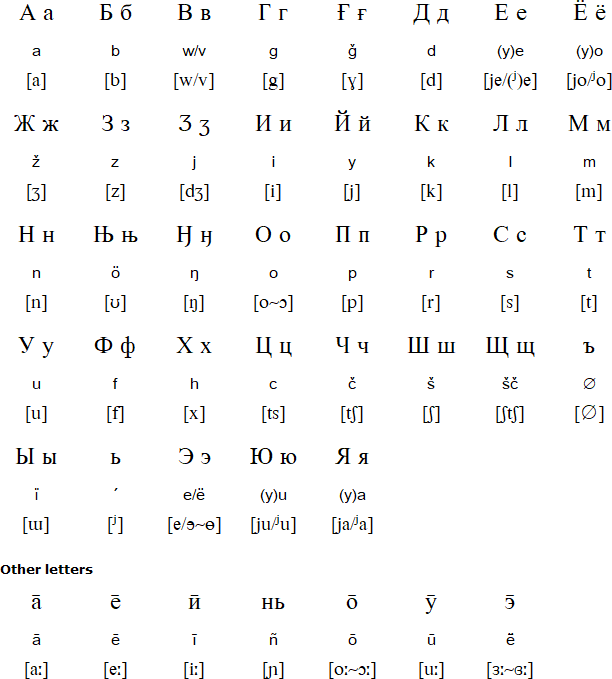Negidal is a Northern Tungusic language spoken in mainly in the along the Amur River in Khabarovsk Krai (Хабаровский край) in the Russian Far East. According to the Russian census of 2010, there are 19 speakers of Negidal out of a population of 513 Negidal people. Other more recent surveys have found fewer than 10 speakers.
Negidal is related closely to Evenki and Even, and is sometimes referred as a dialect of Evenki. The language is also known as El'kan Beye, Elkembey, Ilkan Beye, Neghidal or Negidaly.
There were two dialects of Negidal: Upper Negidal and Lower Negidal. Only Upper Negidal is still spoken.
A way of writing Negidal with the Cyrillic alphabet was devised by M. M. Khasanova (М. М. Хасановой) in 1992, and approved by the authorities in the Khabarovskij Kraj in 1993. However it was rarely used. In 2010 a Negidal textbook for primary schools was published. In 2016 the alphabet was revised with the removal of the letter Ө ө and the introduction of Њ њ.

ё, ж, з, ф, ц, ш, щ, ъ, ы, ь and я are only used in Russian loanwords and names.
Download an alphabet chart for Negidal (Excel)
Details of the Negidal alphabet provided by Michael Peter Füstumum
Улгу бисин. Улгуду тӣ бисе-ен. Гаʔ. Буɣа охин балдичан ни-дэ эсин са̄йа. Так са̄пила Буɣа бисива̄н. Гэ, тай Буɣа бими о̄лча, бэйӈэлбэ очан эӈунмэ, ǯиӈ ǯулла о̄ча йа̄данмэ. Гэ, йа̄данма о̄ча. Тадук о̄ча хэӈтэлбэ. Гэ, диɣинǯи бэгдилкэ̄лбэ о̄ча. Гэ, тай, эӈулбэ, дэɣиктэйи дэɣилба о̄ча. Тадуккэй оловэ о̄лча.
There's a ulgu. It was in Ulga. Here. When Buga* was born, no one knows. It is known (only) that there is (in the world) Bug. And so Buga began to create animals, made a wild boar first. Well, I made a wild boar. Then (all) the others did. He created four-legged. Well, and then he created these flying birds. After that, I made a fish. And I threw it into the water, (a) it doesn't sink.
Source: Negidal language 08 Texts Hokkaido University 2003
Sample text provided by Jin Wei Hii
Information about Negidal | Numbers
Information about Negidal
https://en.wikipedia.org/wiki/Negidal_language
https://ru.wikipedia.org/wiki/Негидальский_язык
https://www.ethnologue.com/18/language/neg/
https://scholarspace.manoa.hawaii.edu/handle/10125/24760
https://bigenc.ru/linguistics/text/2651761
http://lingsib.iea.ras.ru/en/languages/negidal.shtml
https://www.rbth.com/articles/2010/04/26/the_first_abc_book.html
http://altaica.ru/LIBRARY/tungus/negidal.pdf
Even, Evenki, Jurchen, Kili, Manchu, Nanai, Negidal, Oroch, Orok / Uilta, Oroqen, Udege Ulch, Xibe
Abaza, Abkhaz, Adyghe, Aghul, Akhvakh, Akkala Sámi, Aleut, Altay, Alyutor, Andi, Archi, Assyrian / Neo-Assyrian, Avar, Azeri, Bagvalal, Balkar, Bashkir, Belarusian, Bezhta, Bosnian, Botlikh, Budukh, Bulgarian, Buryat, Chamalal, Chechen, Chelkan, Chukchi, Chulym, Chuvash, Crimean Tatar, Dargwa, Daur, Dolgan, Dungan, Enets, Erzya, Even, Evenki, Gagauz, Godoberi, Hinukh, Hunzib, Ingush, Interslavic, Itelmen, Juhuri, Kabardian, Kaitag, Kalderash Romani, Kalmyk, Karaim, Karakalpak, Karata, Karelian, Kazakh, Ket, Khakas, Khanty, Khinalug, Khorasani Turkic, Khwarshi, Kildin Sámi, Kili, Komi, Koryak, Krymchak, Kryts, Kubachi, Kumandy, Kumyk, Kurdish, Kyrgyz, Lak, Lezgi, Lingua Franca Nova, Lithuanian, Ludic, Macedonian, Mansi, Mari, Moksha, Moldovan, Mongolian, Montenegrin, Nanai, Negidal, Nenets, Nganasan, Nivkh, Nogai, Old Church Slavonic, Oroch, Orok, Ossetian, Pontic Greek, Romanian, Rushani, Russian, Rusyn, Rutul, Selkup, Serbian, Shor, Shughni, Siberian Tatar, Sirenik, Slovio, Soyot, Tabassaran, Tajik, Talysh, Tat, Tatar, Teleut, Ter Sámi, Tindi, Tofa, Tsakhur, Tsez, Turkmen, Tuvan, Ubykh, Udege, Udi, Udmurt, Ukrainian, Ulch, Urum, Uyghur, Uzbek, Veps, Votic, Wakhi, West Polesian, Xibe, Yaghnobi, Yakut, Yazghulami, Yukaghir (Northern / Tundra), Yukaghir (Southern / Kolyma), Yupik (Central Siberian)
Page last modified: 21.08.24
[top]
You can support this site by Buying Me A Coffee, and if you like what you see on this page, you can use the buttons below to share it with people you know.

If you like this site and find it useful, you can support it by making a donation via PayPal or Patreon, or by contributing in other ways. Omniglot is how I make my living.
Note: all links on this site to Amazon.com, Amazon.co.uk
and Amazon.fr
are affiliate links. This means I earn a commission if you click on any of them and buy something. So by clicking on these links you can help to support this site.
[top]